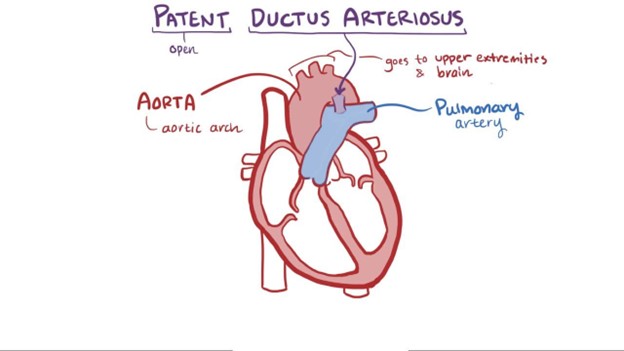A nurse is obtaining vital signs from a 2-month-old infant. The infant's heart rate is 190/min and his temperature is 40° C (104° F). The father asks the nurse why the infant's heart is beating so fast. Which of the following responses by the nurse is appropriate?
"This is within the expected range for your baby."
"The fever is causing an increase in your baby's heart rate."
"As your baby begins to fall asleep. his heart rate will decrease."
"Your baby's heart is beating fast in an attempt to cool down his body."
The Correct Answer is B
In this scenario, the infant has a heart rate of 190/min and a fever of 40°C (104°F). Fever in infants can cause an increase in heart rate, which is a normal physiological response to elevated body temperature. Fever is the body's way of responding to an infection or illness, and it triggers various physiological changes, including an increase in heart rate. This helps the body to circulate blood and deliver immune cells to fight off the infection.
The other options are not accurate or relevant to the infant's current condition:
A. "This is within the expected range for your baby." - A heart rate of 190/min is above the normal expected range for a 2-month-old infant, which is typically between 120 to 160 beats per minute. This response would not address the elevated heart rate and fever.
C. "As your baby begins to fall asleep, his heart rate will decrease." - While heart rate may decrease during sleep, it does not explain the elevated heart rate and fever observed in this situation.
D. "Your baby's heart is beating fast in an attempt to cool down his body." - While tachycardia (fast heart rate) can be associated with increased metabolic demands during fever, the main reason for the increased heart rate in this case is the fever itself, not the body's attempt to cool down. Fever is a response to infection or illness and can cause an increase in heart rate as part of the body's normal immune response.
Nursing Test Bank
Naxlex Comprehensive Predictor Exams
Related Questions
Correct Answer is B
Explanation
A patent ductus arteriosus (PDA) is a congenital heart defect associated with increased pulmonary blood flow. In normal fetal circulation, the ductus arteriosus allows blood to bypass the lungs since the baby receives oxygen from the mother's placenta. After birth, the ductus arteriosus should close, redirecting blood flow to the lungs for oxygenation. However, in some infants with PDA, the ductus arteriosus remains open, causing an abnormal connection between the aorta and the pulmonary artery. As a result, oxygenated blood from the aorta flows back into the pulmonary artery, increasing the workload on the lungs.
The other options are as follows:
A. Coarctation of the aorta - Coarctation of the aorta is a narrowing of the aorta, which obstructs blood flow and leads to increased blood pressure in the upper body and reduced blood flow to the lower body.
C. Tetralogy of Fallot - Tetralogy of Fallot is a combination of four heart defects that results in decreased pulmonary blood flow due to a ventricular septal defect (VSD), overriding aorta, pulmonary stenosis, and right ventricular hypertrophy.
D. Tricuspid atresia - Tricuspid atresia is a congenital heart defect where the tricuspid valve does not develop correctly, resulting in an absent or abnormal tricuspid valve. This defect prevents blood flow from the right atrium to the right ventricle and, therefore, reduces pulmonary blood flow.

Correct Answer is B
Explanation
In this scenario, the infant has a heart rate of 190/min and a fever of 40°C (104°F). Fever in infants can cause an increase in heart rate, which is a normal physiological response to elevated body temperature. Fever is the body's way of responding to an infection or illness, and it triggers various physiological changes, including an increase in heart rate. This helps the body to circulate blood and deliver immune cells to fight off the infection.
The other options are not accurate or relevant to the infant's current condition:
A. "This is within the expected range for your baby." - A heart rate of 190/min is above the normal expected range for a 2-month-old infant, which is typically between 120 to 160 beats per minute. This response would not address the elevated heart rate and fever.
C. "As your baby begins to fall asleep, his heart rate will decrease." - While heart rate may decrease during sleep, it does not explain the elevated heart rate and fever observed in this situation.
D. "Your baby's heart is beating fast in an attempt to cool down his body." - While tachycardia (fast heart rate) can be associated with increased metabolic demands during fever, the main reason for the increased heart rate in this case is the fever itself, not the body's attempt to cool down. Fever is a response to infection or illness and can cause an increase in heart rate as part of the body's normal immune response.
Whether you are a student looking to ace your exams or a practicing nurse seeking to enhance your expertise , our nursing education contents will empower you with the confidence and competence to make a difference in the lives of patients and become a respected leader in the healthcare field.
Visit Naxlex, invest in your future and unlock endless possibilities with our unparalleled nursing education contents today
Report Wrong Answer on the Current Question
Do you disagree with the answer? If yes, what is your expected answer? Explain.
Kindly be descriptive with the issue you are facing.
